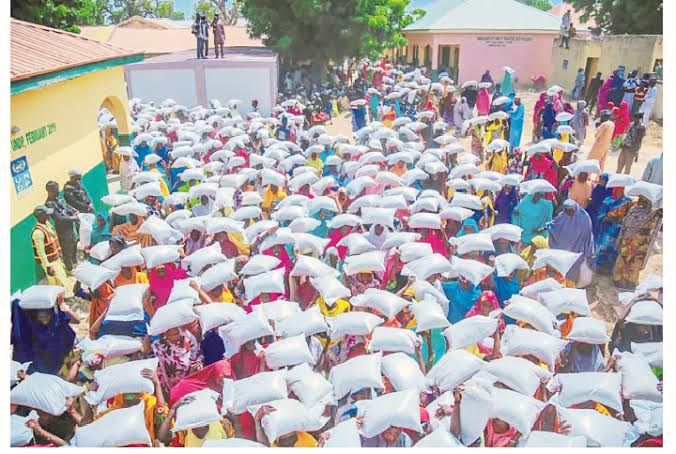Three recent tragic incidents of stampede deaths during food assistance distribution have called into question the organisational preparedness of the organizers and the general indiscipline of the average Nigerian.
On February 24, when the Nigeria Customs Service (NCS) discounted the price of foreign parboiled rice to Nigerians at its zonal headquarters, Harvey Road, Yaba, Lagos, seven people died while struggling to buy the staple.
The rice had been seized from smugglers, and the Service, in trying to ease the hardship faced by Nigerians over food inflation, decided to sell the 25kg bags at N10,000, a sharp discount from the N35,000 it sold in the market.
Trouble started when Lagosians decided to force their way into Customs’ facility. According to reports, those who fell in the process were trampled, and many others fainted.In another such tragedy, at least seven persons died in a stampede at the annual Zakat distribution organized by AYM Shafa Foundation in Bauchi on Friday, March 24.
Most of the victims who died were women and children who trooped out en masse to the Shafa Holdings head office located along Bauchi-Jos Road to collect N10,000 as Zakat from the foundation.
Zakat, one of the pillars of the Islamic faith, requires all Muslims to donate a portion of their wealth to charity. However, the exercise turned tragic after the crowd became uncontrollable as the scramble to get the token before it ran out became fierce.
According to reports, in the midst of the confusion, police operatives, who were stationed at the venue to provide security and control the crowd, fired tear gas canisters, sparking panic and pandemonium at the venue.
In the end, seven females, with ages ranging from 8 to 53, were trampled to death, with others injured.In Nasarawa State, two undergraduates died during food distribution by the state government.
The state had included educational institutions in the distribution of food assistance in its quest to ease the hardship the people are going through following the removal of fuel subsidy by the federal government.
On March 20, however, the exercise turned bloody after the crowd became unruly at the Nasarawa State University, Keffi (NSUK), and claimed the lives of two students of the institution.Such stampede deaths during the distribution of charity are not new.
Last year in Port Harcourt, River State, more than 30 persons were reported dead and others injured in a church when a local charity organization was sharing food after the crowd pushed through the barricade in defiance of the organizers.
It was also reported that Shafa Foundation had done a similar charity exercise in the previous years during Ramadan, also with some casualties. Dr. Ibrahim Disina, one of the leaders of the AYM Shafa Foundation, said the incident was an act ordained by the Almighty, not a deliberate attempt to endanger the lives of the poor.
He, however, admitted that the exercise will be reviewed to forestall future similar occurrences.As a newspaper, we are appalled that people are dying repeatedly from avoidable incidents like these.
It means lessons were not learned from similar tragedies. Tragic outcomes of similar distributions in the past should have prepared subsequent ones to take more adequate measures.
After the deaths, the authorities at Customs, Nasarawa State, and Shafa Foundation admitted that they would devise different means of approaching the exercise in future exercises to avoid a repeat of such tragedies.
We expect no less; people should not have to lose their lives for a morsel of bread, so to speak. We also call on others who want to embark on such an exercise to learn from previous incidents and put measures in place to avoid any sad outcomes in the place of distributing goodies.
Also, organisations that wish to engage in such distribution of charity should collaborate with other organizations trained specially in such things, like the National Emergency Management Agencies and their state arms.
We also recommend that local authorities should be incorporated into the process since they have the respect of the people.
Security agents should also be well-trained and equipped in crowd control. Most times, the ill-handling of crowds leads to things getting out of hand. We also urge Nigerians to learn the wisdom of patience and orderliness.
In all the cases listed, trouble started when people, out of impatience, willful disobedience, or fearing the palliatives might not get to their turn, breached the process put in place by the organisers.
Finally, those whose negligence leads to avoidable deaths should be made to face the law. Attributing organisational ineptitude to the will of God is not good enough.





